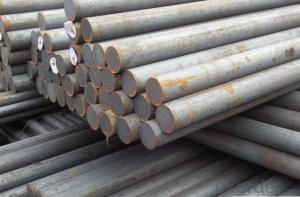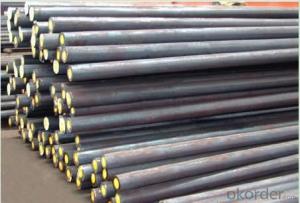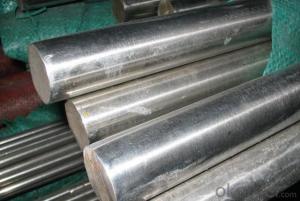Grade ASTM/AISI/SAE 5140 CNBM Alloy Steel Round Bar
- Loading Port:
- Shanghai
- Payment Terms:
- TT OR LC
- Min Order Qty:
- 20 m.t.
- Supply Capability:
- 10000 m.t./month
OKorder Service Pledge
OKorder Financial Service
You Might Also Like
Item specifice
Specifications:
1. Commodity: Round steel bar
2. Technical: Hot rolling
3. Length: Min. 5.8meter, according to requirement.
4.Diameter: 16mm-250mm
Chemical Composition:
Grade | C | Si | Mn | Cr | Ni | Cu | P | S |
40Cr | 0.37-0.44 | 0.17-0.37 | 0.50-0.80 | 0.80-1.10 | ≤0.30 | ≤0030 | ≤0.035 | ≤0.035 |
41Cr4 | 0.38-0.45 | ≤0.40 | 0.60-0.90 | 0.90-1.20 | ≤0.030 | ≤0.030 | ≤0.035 | ≤0.035 |
5140 | 0.38-0.43 | 0.17-0.37 | 0.70-0.90 | 0.70-0.90 | ≤0.030 | ≤0.030 | ≤0.040 | ≤0.035 |
Mechanical Property:
Grade | Tensile Strengthσb (MPa) | Yield Strength | Elongation | Reduction of Area ψ (%) | Impact Akv(J) | Hardness |
σs (MPa) | δ5 (%) | |||||
5140 | ≥980(100) | ≥785(80) | ≥9 | ≥45 | ≥47 | ≤207HB |
Usage and Applications:
Gear, Sleevesspool,Shaft, Crankshaft, Pin
Packaging & Delivery:
Packaging Detail: Standard seaworthy packing or as customer required; all goods are packed in bundle with steel strips and shipped by break bulk vessel or container
Delivery Detail: 15~45 days
Production Flow:
EAF+LF+VD+ Forged+ Heat Treatment
Material prepare (billet) — heat up — rough rolling — precision rolling — cooling — packing — storage and transportation
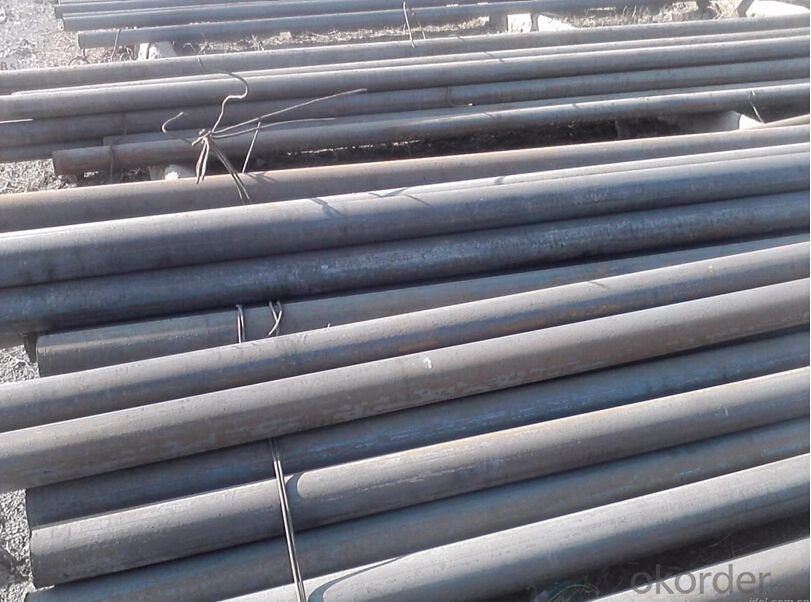
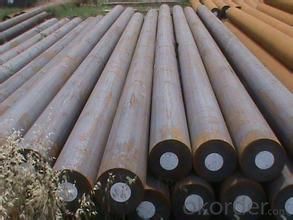
Quality Assurance:
1. We will strictly inspect our production that we sold according to the customer’s request.
2. Our steel reaches international quality standards.
3. Quality should be in conformity with the specification of the manufacturer. Quantity and packing conditions should be in conformity with the term in the contract.
4. Should the packing found damaged, the buyer has the right to claim to the seller
- Q:How does special steel contribute to the aerospace landing gear industry?
- Special steel plays a vital role in the aerospace landing gear industry by providing the necessary strength, durability, and resistance to extreme conditions. It enables the landing gear to withstand heavy loads, high temperatures, and corrosive environments, ensuring the safe landing and takeoff of aircraft. Additionally, special steel's lightweight properties help reduce the overall weight of the landing gear, resulting in improved fuel efficiency and increased payload capacity.
- Q:How does special steel contribute to the ductility of products?
- Special steel contributes to the ductility of products by offering enhanced mechanical properties such as higher tensile strength and improved toughness. This type of steel is specially formulated with alloying elements that promote grain refinement and uniform microstructure, allowing the material to withstand greater deformation without breaking or cracking. Additionally, special steel often undergoes specific heat treatment processes that further enhance its ductility, ensuring that the final products can be easily shaped, bent, or stretched without compromising their structural integrity.
- Q:How is weathering steel used in outdoor structures?
- Weathering steel, also known as Corten steel, is commonly used in outdoor structures due to its unique properties. It forms a protective rust-like layer on its surface, which not only enhances its aesthetic appeal but also acts as a barrier against further corrosion. This makes weathering steel a popular choice for outdoor sculptures, bridges, building facades, and other structures that are exposed to the elements. Additionally, its durability and low maintenance requirements make it a cost-effective and sustainable option for long-lasting outdoor constructions.
- Q:What are the main alloying elements in special steel?
- The main alloying elements in special steel are chromium, nickel, molybdenum, vanadium, and tungsten.
- Q:What are the different alloying elements used in special steel?
- There are various alloying elements used in special steel, including chromium, nickel, molybdenum, vanadium, tungsten, manganese, and silicon, among others. These elements are added in specific quantities to enhance the steel's properties such as corrosion resistance, hardness, toughness, and heat resistance, making it suitable for specific applications in industries like aerospace, automotive, and construction.
- Q:How does special steel contribute to the performance of cutting tools?
- Special steel contributes to the performance of cutting tools in several ways. Firstly, it offers exceptional hardness and strength, enabling the cutting tool to withstand the high forces and pressures encountered during cutting. This durability ensures that the tool remains sharp for longer periods, reducing the need for frequent replacements. Additionally, special steel also possesses excellent heat resistance, preventing the tool from overheating and maintaining its cutting ability. Moreover, special steel can have specific alloying elements that enhance wear resistance, corrosion resistance, and toughness, further improving the performance and lifespan of cutting tools. Overall, the use of special steel in cutting tools enhances their efficiency, reliability, and longevity, resulting in improved cutting precision and reduced downtime.
- Q:How does special steel contribute to the marine machinery industry?
- Special steel contributes to the marine machinery industry by offering high strength, corrosion resistance, and excellent mechanical properties. This enables the construction of durable and reliable components such as propeller shafts, rudder stocks, and engine parts that can withstand harsh marine environments. The use of special steel enhances the performance and longevity of marine machinery, ensuring efficient and safe operations at sea.
- Q:What are the main characteristics of creep-resistant steel forgings?
- Creep-resistant steel forgings possess a range of essential qualities that render them suitable for applications involving high temperatures and prolonged stress and heat exposure. To begin with, these forgings are renowned for their exceptional resistance to creep deformation. Creep refers to the gradual deformation that occurs under constant load and elevated temperatures over an extended period. These forgings are specifically designed to withstand such deformation, retaining their shape and structural integrity. Consequently, they are ideal for use in environments with high temperatures, such as turbine blades, boiler components, and other similar settings. Another crucial characteristic of creep-resistant steel forgings is their impressive strength. These forgings are manufactured using alloying elements like chromium, molybdenum, and vanadium, which enhance their tensile strength. As a result, they exhibit excellent resistance to deformation and fracture under high-stress conditions. This strength is essential for ensuring that the forgings can endure the demands of various applications and perform reliably over time. Furthermore, creep-resistant steel forgings demonstrate good resistance to oxidation and corrosion. The presence of alloying elements creates a protective layer on the surface, safeguarding against oxidation and corrosion at elevated temperatures. This resistance is vital in preventing the degradation of the material and maintaining its mechanical properties, even in harsh environments. Moreover, creep-resistant steel forgings offer outstanding thermal stability. They can endure extreme temperature fluctuations without significant dimensional changes or loss of mechanical strength. This stability is particularly critical in applications that involve rapid heating and cooling cycles, ensuring that the forgings can sustain their performance under challenging conditions. Additionally, creep-resistant steel forgings possess excellent fatigue resistance. Fatigue refers to the weakening of a material resulting from cyclic loading, which is particularly relevant in high-temperature applications due to the combination of stress and heat. These forgings are designed to withstand cyclic loading and retain their mechanical properties, thus reducing the risk of fatigue failure and enhancing the overall reliability of the component. In conclusion, the primary characteristics of creep-resistant steel forgings encompass resistance to creep deformation, high strength, good oxidation and corrosion resistance, thermal stability, and excellent fatigue resistance. These qualities establish creep-resistant steel forgings as a reliable and durable choice for applications requiring resistance to high temperatures, stress, and prolonged exposure to challenging environments.
- Q:How does special steel contribute to the chemical processing industry?
- Special steel plays a crucial role in the chemical processing industry by offering a wide range of benefits that contribute to the overall efficiency and safety of various processes. Firstly, special steel is highly resistant to corrosion, which is an essential characteristic when dealing with corrosive chemicals. This resistance ensures that equipment and pipelines made from special steel can withstand the harsh chemical environments without deteriorating, leading to increased longevity and reduced maintenance costs. Furthermore, special steel provides excellent strength and durability, allowing it to withstand high temperatures and pressures commonly encountered in chemical processing. This strength ensures that equipment such as reactors, heat exchangers, and vessels can operate effectively under demanding conditions, minimizing the risk of failures or accidents. Special steel also offers excellent thermal conductivity, which is highly advantageous in heat transfer applications. This property allows for efficient heat exchange between different fluids, enhancing the overall energy efficiency of chemical processes. By facilitating the effective transfer of heat, special steel aids in optimizing the performance of equipment like condensers, boilers, and evaporators. In addition, special steel is often used in the construction of storage tanks and pipelines for the transportation and distribution of chemicals. Its high resistance to mechanical stress and impact makes it ideal for ensuring the safe containment and transportation of hazardous substances, reducing the risk of leaks or spills that could have serious environmental and safety consequences. Overall, the use of special steel in the chemical processing industry greatly contributes to the reliability, efficiency, and safety of various processes. Its corrosion resistance, strength, thermal conductivity, and durability make it an indispensable material for equipment and infrastructure, ensuring the smooth and secure operation of chemical processing plants.
- Q:What are the main environmental impacts of special steel production?
- The main environmental impacts of special steel production include greenhouse gas emissions, air pollution, water pollution, and the depletion of natural resources. The production process involves high energy consumption, which leads to significant carbon dioxide emissions, contributing to climate change. Additionally, the use of various chemicals and additives in the process can result in air pollution, releasing toxic substances and particulate matter into the atmosphere. Moreover, the production generates wastewater and solid waste, which can contaminate water sources if not properly managed. Finally, the extraction and processing of raw materials like iron ore and coal contribute to the depletion of natural resources and habitat destruction. Overall, special steel production poses substantial environmental challenges that need to be addressed for sustainability.
1. Manufacturer Overview |
|
|---|---|
| Location | |
| Year Established | |
| Annual Output Value | |
| Main Markets | |
| Company Certifications | |
2. Manufacturer Certificates |
|
|---|---|
| a) Certification Name | |
| Range | |
| Reference | |
| Validity Period | |
3. Manufacturer Capability |
|
|---|---|
| a)Trade Capacity | |
| Nearest Port | |
| Export Percentage | |
| No.of Employees in Trade Department | |
| Language Spoken: | |
| b)Factory Information | |
| Factory Size: | |
| No. of Production Lines | |
| Contract Manufacturing | |
| Product Price Range | |
Send your message to us
Grade ASTM/AISI/SAE 5140 CNBM Alloy Steel Round Bar
- Loading Port:
- Shanghai
- Payment Terms:
- TT OR LC
- Min Order Qty:
- 20 m.t.
- Supply Capability:
- 10000 m.t./month
OKorder Service Pledge
OKorder Financial Service
Similar products
New products
Hot products
Hot Searches
Related keywords

